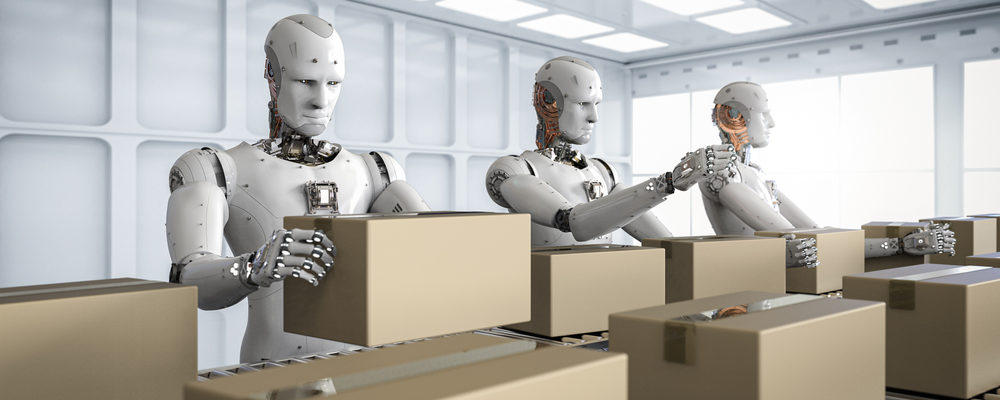Workplace automation is poised to accelerate as a result of the Covid-19 crisis, according to a recent report from the BBC (BBC News, 19 April 2020).
In the piece, tech reporter Zoe Thomas writes: “As a pandemic grips the world, a person could be forgiven if they had forgotten about another threat to humanity’s way of life – the rise of robots. For better or worse the robots are going to replace many humans in their jobs, analysts say, and the coronavirus outbreak is speeding up the process.”
While Thomas cites examples of companies harnessing automation to assist social distancing – such as delivery firms taking on more robots in their warehouses – she notes that the very workers who are ostensibly being protected by such measures could end up losing their jobs as a result of the additional mechanical labour.
She adds: “A 2017 report by global consultants McKinsey predicted a third of workers in the US would be replaced by automation and robots by 2030. But events like pandemics have the potential to change all the timelines and experts say it’s really up to humans to decide how they want to integrate this technology in the world.”
The BBC report emerged just a day after the Institute for Social and Economic Research (ISER) warned that the lockdown could take 6.5 million jobs out of the UK economy (ISER, 18 April 2020).
Speaking to the press about the daunting stat, ISER study leader and labour-markets modelling expert Professor Matteo Richiardi said: “If this [pandemic] is short, say a few months, the links between employers and employees of affected industries might not be severed, and individual careers might not suffer too much.” However, he noted: “Under a longer lockdown, losses of human capital and scarring effects will occur. The economy will still bounce back, but at a higher cost for individuals.” (The Guardian, 19 April 2020)
In late March, a survey from ‘Big Four’ auditor EY revealed that almost half (41%) of top bosses in 45 countries are speeding up their business-automation plans while their workers stay at home, with the aim of preparing their firms for life in a pre-crisis world (Yahoo! News, 29 March 2020).
EY global vice chair, transaction advisory services, Steve Krouskos said: “Business leaders are seeing their transformation plans paused or slowed currently. With these plans set to restart – possibly with added energy – once the situation stabilises, executives will have to make faster moves to reimagine, reshape and reinvent their businesses and create long-term value.”
How likely is it that leaders will take the Covid-19 crisis as carte blanche for sweeping and rapid automation, during a period of significant uncertainty for human jobs that could last for several months?
The Institute of Leadership & Management’s head of research, policy and standards Kate Cooper says: “The first thing that struck me about the BBC report was that it seemed to convey this notion of a queue of robots lining up to take human jobs, and that we’re going to have to use them instead of people. Yes, robots – and other artificial intelligence tools – are increasingly acquiring human attributes. But fundamentally, they are technology. And in order to take on a greater volume of technology to upgrade your business’s infrastructure, you require a huge amount of investment.”
She notes: “In this current crisis, firms have been hit with severe problems relating to cash flow. Much like the aftermath of the 2008 financial crash, if we go into recession, we are likely to see restrictions on lending. Governments are going to build up huge deficits in their efforts to maintain the welfare of their populations, through initiatives such as supporting furloughed workers and turbocharging healthcare. So, one has to ask: where is all this money going to come from?”
Cooper stresses: “We are still not in a position to replace people in jobs that depend upon empathy and a range of variable responses. And I think what we have seen in the past few weeks is a new appreciation and regard for those very human skills. So if companies are taking advantage of this moment in time to lay off large numbers of staff, they’re going to have to find a huge amount of capital in order to do that.
“At the same time, we have seen from the massive surge towards home working just how adaptable people are, in a way that perhaps robots and AI tools are not. And all of the social skills that we have identified as so necessary at this time – however much we invest in technology – are still going to be in high demand.”
She adds: “I don’t think the bleak prognosis for human labour set out in the BBC report and EY research has much bearing on the reality of the crisis, or the needs it has created. Is further investment in non-human jobs going to be the best way forward for society at large? And where are those decisions going to be made? For the time being, welfare and the health of nations will have to be at the very top of government agendas.”
For further insights on the themes raised in this blog, check out the Institute’s resources on ethics
Source refs:

